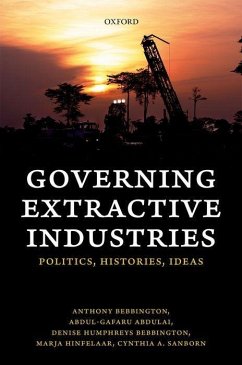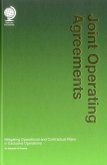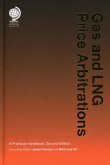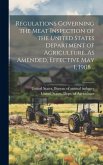Anthony Bebbington, Abdul-Gafaru Abdulai, Denise Humphreys Bebbington, Marja Hinfelaar, Cynthia Sanborn
Governing Extractive Industries
Politics, Histories, Ideas
Anthony Bebbington, Abdul-Gafaru Abdulai, Denise Humphreys Bebbington, Marja Hinfelaar, Cynthia Sanborn
Governing Extractive Industries
Politics, Histories, Ideas
- Gebundenes Buch
- Merkliste
- Auf die Merkliste
- Bewerten Bewerten
- Teilen
- Produkt teilen
- Produkterinnerung
- Produkterinnerung
This book synthesizes findings regarding the political drivers of institutional change in extractive industry governance. It analyses resource governance from the late nineteenth century to the present in Bolivia, Ghana, Peru, and Zambia, focusing on the ways in which resource governance and national political settlements interact.
Andere Kunden interessierten sich auch für
![Joint Operating Agreements Joint Operating Agreements]() Eduardo PereiraJoint Operating Agreements240,99 €
Eduardo PereiraJoint Operating Agreements240,99 €![Gas and Lng Price Arbitrations: A Practical Handbook Gas and Lng Price Arbitrations: A Practical Handbook]() Mark LevyGas and Lng Price Arbitrations: A Practical Handbook300,99 €
Mark LevyGas and Lng Price Arbitrations: A Practical Handbook300,99 €![Regulations Governing the Meat Inspection of the United States Department of Agriculture. As Amended, Effective May 1, 1908 .. Regulations Governing the Meat Inspection of the United States Department of Agriculture. As Amended, Effective May 1, 1908 ..]() Regulations Governing the Meat Inspection of the United States Department of Agriculture. As Amended, Effective May 1, 1908 ..33,99 €
Regulations Governing the Meat Inspection of the United States Department of Agriculture. As Amended, Effective May 1, 1908 ..33,99 €![Governing Interests Governing Interests]() Wolfgang Streeck / Jurgen Grote / Volker Schneider / Jelle Visser (eds.)Governing Interests202,99 €
Wolfgang Streeck / Jurgen Grote / Volker Schneider / Jelle Visser (eds.)Governing Interests202,99 €![Upstream Oil and Gas Upstream Oil and Gas]() Globe Business PlanningUpstream Oil and Gas258,99 €
Globe Business PlanningUpstream Oil and Gas258,99 €![Regulations Governing the Withdrawal of Wine Spirits Or Grape Brandy From Distilleries and Special Bonded Warehouses, Free of Tax, for the Fortificati Regulations Governing the Withdrawal of Wine Spirits Or Grape Brandy From Distilleries and Special Bonded Warehouses, Free of Tax, for the Fortificati]() Regulations Governing the Withdrawal of Wine Spirits Or Grape Brandy From Distilleries and Special Bonded Warehouses, Free of Tax, for the Fortificati37,99 €
Regulations Governing the Withdrawal of Wine Spirits Or Grape Brandy From Distilleries and Special Bonded Warehouses, Free of Tax, for the Fortificati37,99 €![Renewable Energy Support Schemes in the EU Renewable Energy Support Schemes in the EU]() Theodoros G IliopoulosRenewable Energy Support Schemes in the EU203,99 €
Theodoros G IliopoulosRenewable Energy Support Schemes in the EU203,99 €-
-
-
This book synthesizes findings regarding the political drivers of institutional change in extractive industry governance. It analyses resource governance from the late nineteenth century to the present in Bolivia, Ghana, Peru, and Zambia, focusing on the ways in which resource governance and national political settlements interact.
Hinweis: Dieser Artikel kann nur an eine deutsche Lieferadresse ausgeliefert werden.
Hinweis: Dieser Artikel kann nur an eine deutsche Lieferadresse ausgeliefert werden.
Produktdetails
- Produktdetails
- Verlag: Oxford University Press, USA
- Seitenzahl: 292
- Erscheinungstermin: 28. August 2018
- Englisch
- Abmessung: 236mm x 160mm x 23mm
- Gewicht: 612g
- ISBN-13: 9780198820932
- ISBN-10: 0198820933
- Artikelnr.: 51385808
- Herstellerkennzeichnung
- Libri GmbH
- Europaallee 1
- 36244 Bad Hersfeld
- 06621 890
- Verlag: Oxford University Press, USA
- Seitenzahl: 292
- Erscheinungstermin: 28. August 2018
- Englisch
- Abmessung: 236mm x 160mm x 23mm
- Gewicht: 612g
- ISBN-13: 9780198820932
- ISBN-10: 0198820933
- Artikelnr.: 51385808
- Herstellerkennzeichnung
- Libri GmbH
- Europaallee 1
- 36244 Bad Hersfeld
- 06621 890
Anthony Bebbington is Australia Laureate Fellow at the University of Melbourne, and from 2010-2017 was Director of the Graduate School of Geography at Clark University where he is also Milton P. and Alice C. Higgins Professor of Environment and Society (on leave). He is a member of the US National Academy of Sciences and the American Academy of Arts and Sciences, and has been a Guggenheim Fellow and held fellowships at the Center for Advanced Studies in the Behavioral Sciences, Stanford, the Iberoamerican Institute/Free University in Berlin among others. He is also Professorial Fellow at the Global Development Institute of the University of Manchester and Research Associate with Rimisp-Latin American Centre for Rural Development in Chile. Abdul-Gafaru Abdulai is a Senior Lecturer at the University of Ghana Business School, and an Honorary Research Fellow at the Global Development Institute, University of Manchester, UK. Dr. Abdulai holds a First Class Bachelors degree in Political Science from the University of Ghana (Legon-Accra), an MPhil in Development Studies from the University of Cambridge (UK), and a PhD in Development Policy and Management from the University of Manchester (UK). His work has been published by African Affairs; New Political Economy, Democratization, Development Policy Review ; European Journal of Development Research; and the Journal of International Development. He won the prestigious Herti Gesseling Prize for best paper authored by an African-based scholar in 2016. Denise Humphreys Bebbington is Research Associate Professor of International Development and Social Change at Clark University, and from 2012 to 2016 was also Director of the Women and Gender Studies Program at Clark. Previously she has been Latin America Coordinator for the Global Greengrants Fund and Foundation Representative to Peru for the Inter-American Foundation, among other research and development positions. Her research has addressed the interactions among indigenous peoples and hydrocarbons development in Bolivia, extractive industry conflicts, gender and resource governance, women and micro-finance, and the roles of NGOs in development. She holds a PhD in Development Studies from the University of Manchester, and a B.A. in History from the University of California at Berkeley. She is a member of the Editorial Board of Extractive Industries and Society. Marja Hinfelaar is a historian and political analyst. She is Director of Research and Programs at the Southern African Institute for Policy and Research, where she coordinates research projects, the Cornell University Summer Pogram, the Zambia Legal Information Institute, the Economic Policy Resources Centre, and publications. She received her PhD in History in 2001 from the University of Utrecht, the Netherlands. She was previously the coordinator of digitization projects, based at the National Archives of Zambia. She is Member of Advisory Board of the Journal of Southern African Studies, and editor of the Zambia Social Science Journal. Cynthia Sanborn is Vice President for Research at the Universidad del Pacífico in Lima, Peru, where she is also a Professor of Political Science. She has written and edited articles and books on issues related to politics and development in Latin America, including work on corporate social responsibility and the extractive industries, and Chinese investment in that region. Sanborn is part of the Working Group on Development and the Environment in the Americas at Boston University, and has held the William Henry Bloomberg Chair at Harvard University. She has been a program officer for the Ford Foundation, and member of the national working group of the Extractive Industries Transparency Initiative (EITI) in Peru. She holds a PhD and MA in Government from Harvard University and a BA in Political Science from the University of Chicago.
* 1: Resource extraction and inclusive development: extending the bases
of the political settlements approach
* 2: Mining, political settlements, and inclusive development in Peru
* 3: Political settlements, natural resource extraction, and inclusion
in Bolivia
* 4: The politics of natural resource extraction in Zambia
* 5: Competitive clientelism and the political economy of mining in
Ghana
* 6: Conclusions: Interpreting the politics of natural resource
extraction
of the political settlements approach
* 2: Mining, political settlements, and inclusive development in Peru
* 3: Political settlements, natural resource extraction, and inclusion
in Bolivia
* 4: The politics of natural resource extraction in Zambia
* 5: Competitive clientelism and the political economy of mining in
Ghana
* 6: Conclusions: Interpreting the politics of natural resource
extraction
* 1: Resource extraction and inclusive development: extending the bases
of the political settlements approach
* 2: Mining, political settlements, and inclusive development in Peru
* 3: Political settlements, natural resource extraction, and inclusion
in Bolivia
* 4: The politics of natural resource extraction in Zambia
* 5: Competitive clientelism and the political economy of mining in
Ghana
* 6: Conclusions: Interpreting the politics of natural resource
extraction
of the political settlements approach
* 2: Mining, political settlements, and inclusive development in Peru
* 3: Political settlements, natural resource extraction, and inclusion
in Bolivia
* 4: The politics of natural resource extraction in Zambia
* 5: Competitive clientelism and the political economy of mining in
Ghana
* 6: Conclusions: Interpreting the politics of natural resource
extraction








